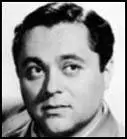Joseph Bromberg

Joseph Bromberg was born in Timisoara, part of the Austria-Hungarian Empire, on 25 December, 1903. The family moved to the United States in 1908 and settled in New York City. After graduating from Stuyvesant High School, he had acting lessons with Leo Bulgakov, who had a student with Constantin Stanislavski.
Bromberg eventually joined the Group Theatre in New York led by Lee Strasberg. Members of the group tended to hold left-wing political views and wanted to produce plays that dealt with important social issues. Bromberg joined the American Communist Party and in 1935 appeared in Waiting for Lefty, a play by a fellow party member, Clifford Odets. Another member, Elia Kazan, claimed Joe Bromberg was one of the Group company I most admired. I thought he was an immensely talented actor when I joined that organization, a man who could play a great variety of character parts.
Bromberg, like others involved in the Group Theatre moved to Hollywood and appeared in his first film, Star for a Night, in 1936. Over the next ten years Bromberg appeared in 46 films including Three Sons (1939), The Mark of Zorro (1940), Pacific Blackout (1941), The Devil Pays Off (1941), Invisible Agent (1942), The Man on America's Conscience (1942) and Phantom of the Opera (1943).
After the Second World War the House of Un-American Activities Committee began an investigation into the Hollywood Motion Picture Industry. In September 1947, the HUAC interviewed 41 people who were working in Hollywood. These people attended voluntarily and became known as "friendly witnesses". During their interviews they named several people who they accused of holding left-wing views. This included Bromberg and several of those involved with the Group Theatre including John Garfield, Lee J. Cobb, Elia Kazan, and Clifford Odets.
One of those named, Bertolt Brecht, an emigrant playwright, gave evidence and then left for East Germany. Ten others: Herbert Biberman, Lester Cole, Albert Maltz, Adrian Scott, Samuel Ornitz, Dalton Trumbo, Edward Dmytryk, Ring Lardner Jr., John Howard Lawson and Alvah Bessie refused to answer any questions.
Known as the Hollywood Ten, they claimed that the 1st Amendment of the United States Constitution gave them the right to do this. The House of Un-American Activities Committee and the courts during appeals disagreed and all were found guilty of contempt of congress and each was sentenced to between six and twelve months in prison.
However, others agreed to testify and three people, Lee J. Cobb, Elia Kazan, and Clifford Odets, named Bromberg as a member of the Communist Party. When Bromberg was called before the House of Un-American Activities Committee in 1951, he refused to name names. Blacklisted, Bromberg moved to England and was working on a play when he died of a heart-attack on 6th December, 1951. Elia Kazan has claimed: " It has been said that the House Committee on Un-American Activities (HUAC) killed Joe. Certainly the pressure he was subjected to shoved him over the brink."
Primary Sources
(1) Elia Kazan who worked with Joseph Bromberg at the Group Theatre, wrote about him in his autobiography, A Life (1988)
Joe Bromberg was one of the Group company I most admired. I thought he was an immensely talented actor when I joined that organization, a man who could play a great variety of character parts. It has been said that the House Committee on Un-American Activities (HUAC) killed Joe. Certainly the pressure he was subjected to shoved him over the brink.
(2) Elia Kazan received a letter from an actor who was angry about the way the director had treated Joseph Bromberg.
Elia. Shame! I shall continue to greet you in the course of our associations but only on the basis of formal courtesy. If it remains uncontested that you refused to pay public tribute to Bromberg and to denounce those filthy politicians who hastened his breakdown, I shall one day lose my composure and publicly castigate you, preferably at one dinner or another.
Never have I agreed with past so-called progressive ideas you have expressed; but my respect for your opinion is shattered by your cowardice in the face of the McCarthyism which even my conservatism cannot stomach.
